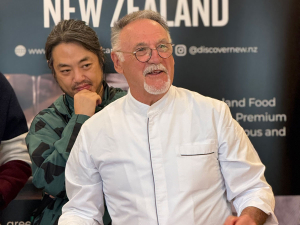OSPRI writes off $17m over botched traceability system
Animal disease management agency OSPRI has written off nearly $17 million after a botched attempt to launch a new integrated animal disease management and traceability system.
 Graham Brown has been promoting New Zealand's farmed venison to chefs and consumers around the world for more than 30 years.
Graham Brown has been promoting New Zealand's farmed venison to chefs and consumers around the world for more than 30 years.
Graham Brown, the executive chef for Deer Industry New Zealand (DINZ), is excited about Korea.
Brown has been promoting this country’s farmed venison to chefs and consumers around the world for more than 30 years, but until last month he had never been to Korea.
There is an understandable reason for that: Korea is best known to the New Zealand deer industry as the main market destination for deer velvet antler, but thus far the other main deer product – venison – has only been sold there in very small amounts.
Brown has developed a knack over the years for matching national and regional cuisines to the virtues of venison as a lean, healthy and versatile meat. In recent years those skills have been applied in Asia – China especially, which is now New Zealand’s second-largest venison market after the US. He feels Korean cuisine could make excellent use of venison, which has the qualities that could easily adapt to the many beef-based dishes.
His son Hamish, a successful chef based in London, had sent Graham a book on Korean cuisine which he absorbed from cover to cover. That research, combined with a visit to a local restaurant in Seoul, convinced Brown that venison would be right at home in Korean restaurants. “The place we went to had simple but tasty ingredients and a Wagyu-type beef cooked at the table in thin slices, eaten with dipping sauce – perfect for venison!”
He says venison would fit equally well in more upscale restaurants in Korea, as it does in China. Although it was a whirlwind visit, Brown loved what he saw of Korea and its people. The focus of the DINZ visit was a reception and dinner for invited chefs, food influencers, trade officials and marketers, hosted at the residence of the New Zealand ambassador to Korea, Dawn Bennet. The menu featured five contrasting venison-based courses including some with an Asian theme such as a broth with udon noodles and short ribs with yakiniku glaze.
While he sees great potential for New Zealand venison in Korea, Brown acknowledges that before trade can be ramped up there is plenty of work to be done, to ensure exporters can get reliable supplies of the product in a form that best suits Korean cuisine and restaurants.
“The first step is to work at the coal face with chefs and that’s what we were able to start doing at this event.” Brown says the feedback from guests was overwhelmingly positive, with flavour, texture and healthiness of the dishes rating especially highly.
He was part of a DINZ delegation to China and Korea in March. A delayed flight meant a very packed schedule when Brown arrived in Shanghai for the first leg of the Asian tour, with locally based Kiwi Hunter McGregor providing excellent logistical support. “We hosted three events for chefs on that first day. Without exception they were strongly interested in the cuts and dishes we showed them. I learnt a long time ago that it’s not about showing off my skills, it’s about the product.”
Brown says the chefs in China, many from other parts of the world, were very curious about the origins of the product and how it was raised, so the New Zealand story resonates well.
The restaurant trade in China was still recovering from the Covid pandemic and Brown says the chefs who attended the events also enjoyed the opportunity to network and reconnect.
He says the cuisine in China has big regional contrasts, but ever since his first visit to the country more than 20 years ago he’s been convinced there is big potential in that country for venison. This was at a time when the main meat export to China from New Zealand was lamb flaps and there was some initial scepticism from meat companies here. However, that initial faith has been well and truly vindicated.
Fonterra’s impending exit from the Australian dairy industry is a major event but the story doesn’t change too much for farmers.
Expect greater collaboration between Massey University’s school of Agriculture and Environment and Ireland’s leading agriculture university, the University College of Dublin (UCD), in the future.
A partnership between Torere Macadamias Ltd and the Riddet Institute aims to unlock value from macadamia nuts while growing the next generation of Māori agribusiness researchers.
A new partnership between Dairy Women’s Network (DWN) and NZAgbiz aims to make evidence-based calf rearing practices accessible to all farm teams.
Despite some trying circumstances recently, the cherry season looks set to emerge on top of things.
Changed logos on shirts otherwise it will be business as usual when Fonterra’s consumer and related businesses are expected to change hands next month.

OPINION: Here w go: the election date is set for November 7 and the politicians are out of the gate…
OPINION: ECan data was released a few days ago showing Canterbury farmers have made “giant strides on environmental performance”.